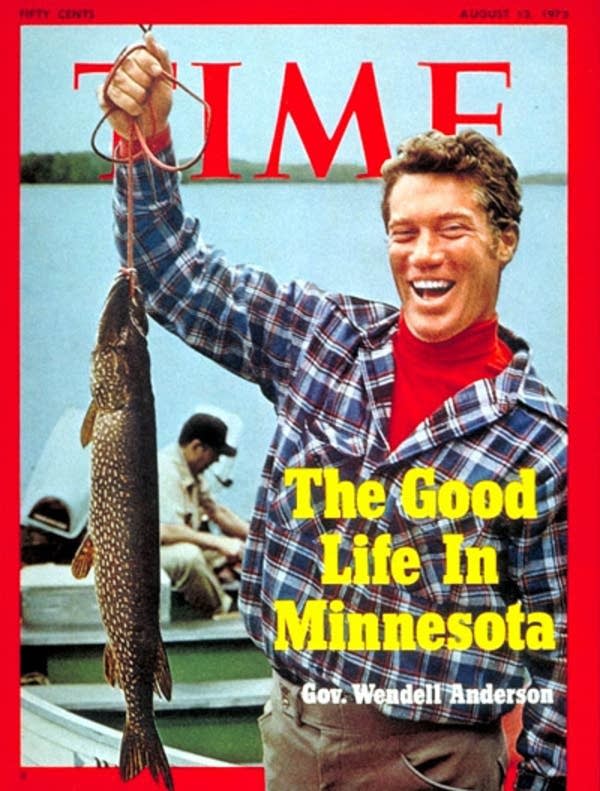Wendell Anderson, state's 33rd governor, dead at 83

Go Deeper.
Create an account or log in to save stories.
Like this?
Thanks for liking this story! We have added it to a list of your favorite stories.
Former Gov. Wendell Anderson, a collegiate and Olympic hockey star who rose rapidly to Minnesota's highest office but saw his political career extinguished just as quickly, has died at age 83.
His family announced his death Sunday. Anderson had been in hospice care.
"Governor Anderson was one of Minnesota's greatest governors," Governor Mark Dayton said in a press release. "His transformational 'Minnesota Miracle' — which he achieved through one of the most momentous bipartisan agreements in our state's history - has dramatically improved the quality of our state's public education."
At his political prime in the 1970s, Anderson championed what become known as the "Minnesota Miracle" and graced the cover of Time magazine as the leader of a state other places could emulate. A political power play cut his career short, but Anderson left a lasting mark.
Turn Up Your Support
MPR News helps you turn down the noise and build shared understanding. Turn up your support for this public resource and keep trusted journalism accessible to all.
Even before Wendell Anderson stepped into politics, he secured a revered place in Minnesota history. The former University of Minnesota hockey star brought home a silver medal from the 1956 Olympics in Italy.
The renowned competitiveness he displayed on the ice earned him a spot in the Minnesota Legislature just a few years later. And eventually, the determination landed him in the governor's office at age 37.
Wendy, as he was more commonly called, had a lot going for him. Dashing looks. Smooth delivery. And he was a popular figure in a Democratic-Farmer-Labor Party only starting to flex its muscle in Minnesota government. Some saw him as a midwestern John F. Kennedy.

Time magazine featured a beaming, flannel-shirted Anderson holding a northern pike next to the words: "The Good Life In Minnesota." His 1974 State of the State address was something of a victory lap.
"It is our job as our state to protect our people with all the strength we have," Anderson said. "It is our job to keep our people working and our farmers farming. It's our job to preserve the ability of industry and small business to support a strong Minnesota economy. And it is our job as a state to pay more thoughtful attention to the future."
Anderson would usher in a heralded school finance change that pushed costs away from property taxes to state taxes. What was called the "Minnesota Miracle" helped even out disparities between districts.
Tom Berg was a DFL House member at the time and would later write a book on the overhaul.
"He fixed it." Berg said. "People remembered that."
Anderson wagered that voters would accept higher state taxes for the promise of better schools, and they backed him. Republicans branded him "Spendy Wendy" but he piled up a two-to-one re-election win.
Roger Moe was a young DFL state senator at the time. Moe says Anderson drove a powerful agenda on school finance, tax policy and environmental policy.
"I'll put this up against anybody in terms of political history of the state," Moe said. "I doubt there will ever be, there certainly hasn't been and I doubt there will ever be another six years of kind of progressive legislation that has had a lasting impact for our state like the six years when Wendy was governor."
It's not that Anderson was a natural politician. Moe remembers Anderson telling him how he would go into a crowded room and look for a familiar face to sidle up to instead of shaking every hand in front of him.
"Although he has loosened up a lot more since then, back when he was governor I don't think most people knew he was actually quite shy," Moe said.
And it's easy to forget that Anderson wasn't even the biggest star in his home-state party. Hubert Humphrey was a former vice president and then back in the U.S. Senate. And Sen. Walter Mondale was about to become vice president himself. That turn proved fateful for Anderson.
After the 1976 election, Anderson resigned as governor and his lieutenant governor, Rudy Perpich, appointed him to Mondale's vacant Senate seat.
Voters were angered by the perceived arrogance. And Republicans used that against Anderson and other Democrats in the 1978 election, when the DFL took a beating and voters sent Anderson packing.
In a 2003 MPR interview, Anderson was candid in calling the position swap a mistake.
"I think the people of Minnesota felt they had elected me as governor for four years and wanted me to stay there," he said. "I think that's fair. I don't disagree with the decision they made."
Republican Rudy Boschwitz beat Anderson in that Senate race. To Boschwitz's surprise, it would mark the end of Anderson's political career.
"He was in his middle 40s at that time and I certainly thought he would seek a comeback. But he didn't," Boschwitz said.
Boschwitz and Anderson's own relationship would grow. The two sometimes met for walks or runs on a suburban trail, discussing current affairs, not their ballot rivalry.
In the 2003 interview Anderson looked back on his days in politics as different than the more toxic brand that came later.
"I was privileged to be governor when people were nice to one another," he said. "Republicans and Democrats got along, were able to do significant things for the state of Minnesota because they liked one another. They respected one another."





